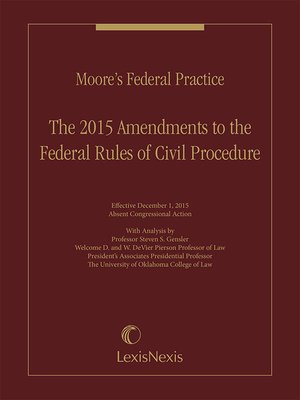Moore's Federal Practice
ebook ∣ The 2015 Amendments to the Federal Rules of Civil Procedure
By Steven S. Gensler

Sign up to save your library
With an OverDrive account, you can save your favorite libraries for at-a-glance information about availability. Find out more about OverDrive accounts.
Find this title in Libby, the library reading app by OverDrive.



Search for a digital library with this title
Title found at these libraries:
| Library Name | Distance |
|---|---|
| Loading... |
This pamphlet provides a comprehensive resource for litigators who wish to understand the scope and significance of the December 1, 2015 amendments to the Federal Rules of Civil Procedure. These amendments are expected to have a significant impact for all federal litigators, particularly in the area of discovery. The amendments are intended to encourage a quicker and less expensive discovery process by promoting active judicial case management and increased cooperation among the parties. Additionally, the amendments incorporate the concept of proportionality to determine the initial scope of discovery, and introduce a national standard for sanctions when electronically stored information is lost. Affected rules include Civil Rules 1, 4, 16, 26, 30, 31, 33, 34, 37, 55, and 84.
The pamphlet features in-depth analysis by Professor Steven S. Gensler explaining the rule changes. From 2005 to 2011, Professor Gensler served as a member of the United States Judicial Conference Advisory Committee on Civil Rules, during which time he had a direct role in shaping the rule amendments. Professor Gensler was also a member of the Planning Committee for the 2010 Duke Conference on Civil Litigation, where many of the rule proposals had their start.
The pamphlet includes the full text of the rule amendments, with Advisory Committee notes. Additionally, it sets out several important Advisory Committee reports, to provide insight on the historical development of the rule proposals.
The eBook versions of this title feature links to Lexis Advance for further legal research options.







